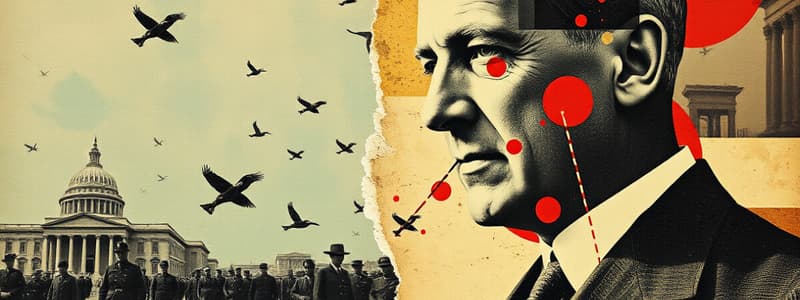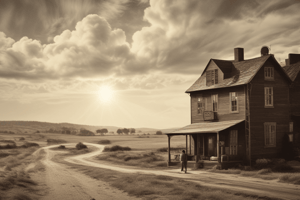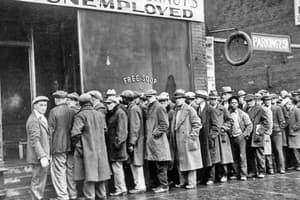Podcast
Questions and Answers
What percent of Americans were investing in the stock market prior to the crash?
What percent of Americans were investing in the stock market prior to the crash?
10%
What was FDR's 'court-packing scheme'?
What was FDR's 'court-packing scheme'?
An attempt to appoint up to six new justices who would be friendly to his interests
Which of the following statements regarding immigration during the Great Depression is true?
Which of the following statements regarding immigration during the Great Depression is true?
- More people entered the United States than left it
- There was no change in immigration patterns
- Immigration rates increased significantly
- More people left the United States than entered it during the Great Depression (correct)
What is the definition of Herbert Hoover's 'Associationalism'?
What is the definition of Herbert Hoover's 'Associationalism'?
Louisiana Senator Huey Long criticized Roosevelt's New Deal programs for ____________
Louisiana Senator Huey Long criticized Roosevelt's New Deal programs for ____________
Which of the following actions did FDR take to advance civil rights for African Americans?
Which of the following actions did FDR take to advance civil rights for African Americans?
Upon assuming office, how did Roosevelt respond to the collapsing bank system?
Upon assuming office, how did Roosevelt respond to the collapsing bank system?
Which of the following was the most consequential example of agricultural mismanagement during the Great Depression?
Which of the following was the most consequential example of agricultural mismanagement during the Great Depression?
What was the Bonus Army?
What was the Bonus Army?
Which group of Americans benefitted the least from the economic changes of the 1920s?
Which group of Americans benefitted the least from the economic changes of the 1920s?
What was the consequence of the Smoot-Hawley Tariff of 1930?
What was the consequence of the Smoot-Hawley Tariff of 1930?
How did the Federal Reserve respond to the financial collapse?
How did the Federal Reserve respond to the financial collapse?
What did the Agricultural Adjustment Act (AAA) aim to do?
What did the Agricultural Adjustment Act (AAA) aim to do?
What did the Works Progress Administration do?
What did the Works Progress Administration do?
What was the most dramatic result of the 1938 Fair Labor Standards Act?
What was the most dramatic result of the 1938 Fair Labor Standards Act?
Flashcards are hidden until you start studying
Study Notes
Stock Market and Economic Conditions
- Prior to the stock market crash, only 10% of Americans were investing in the stock market.
FDR and Judicial Influence
- FDR proposed a "court-packing scheme" to appoint up to six justices aligned with his policies.
Immigration Trends
- During the Great Depression, more individuals left the U.S. than those entering.
Hoover's Economic Philosophy
- Herbert Hoover's "Associationalism" advocated for voluntary business practices to promote economic welfare without government intervention.
Critique of the New Deal
- Senator Huey Long criticized Roosevelt's New Deal for not effectively redistributing wealth to address economic inequality.
Civil Rights Progress
- No significant actions taken by FDR advanced civil rights for African Americans during his presidency.
Banking Crisis Response
- Roosevelt declared a bank holiday and facilitated the Emergency Banking Act to address the banking crisis upon taking office.
Environmental Impact
- Agricultural mismanagement, particularly plowing up natural ground cover for crops in the Plains, significantly contributed to environmental degradation during the Great Depression.
Bonus Army
- The Bonus Army consisted of WWI veterans seeking early payment of bonuses due in 1945, highlighting veterans' struggles during the economic downturn.
Economic Impact on Southern Farmers
- Southern farmers were among the group of Americans who benefitted the least from the economic changes of the 1920s.
Smoot-Hawley Tariff Effects
- The Smoot-Hawley Tariff of 1930 led to a dramatic collapse in international trade, worsening the economic crisis.
Federal Reserve Actions
- The Federal Reserve's response to the financial collapse involved raising interest rates and tightening credit, which exacerbated economic conditions.
Agricultural Adjustment Act (AAA)
- The AAA aimed to raise agricultural commodity prices by providing cash incentives to farmers to limit production, thereby driving prices higher.
Works Progress Administration (WPA)
- The WPA was established to create jobs for unemployed individuals through local government projects, focusing on community needs.
Fair Labor Standards Act (FLSA)
- The significant achievement of the 1938 Fair Labor Standards Act was the establishment of a national minimum wage, marking a major labor reform.
Studying That Suits You
Use AI to generate personalized quizzes and flashcards to suit your learning preferences.




